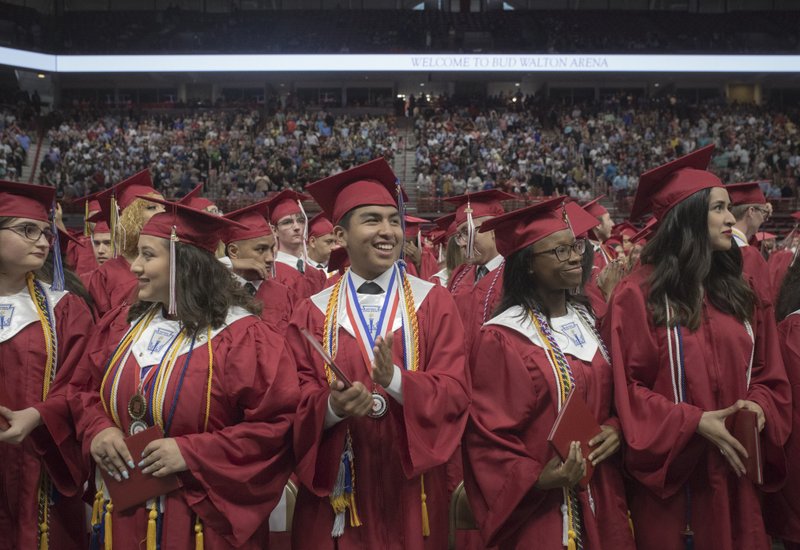FAYETTEVILLE — Northwest Arkansas is growing more racially and ethnically diverse as its overall population grows, according to U.S. Census Bureau data released this week.
That trend impacts local school districts, many of which are trying to achieve greater diversity among educators in order to match the demographics of the students they serve.
“Research has proven that kids have a tendency to respond and do much better when they see people who look like themselves,” said John L Colbert, superintendent of the Fayetteville School District.
The Census Bureau released 2018 population estimates for the nation, states and counties by age, sex, race and Hispanic origin.
The data show Benton and Washington counties’ population rose from 424,404 to 509,569 from 2010 to 2018, a 20% increase.
The number of white people in the two counties dropped from 90% to 87.7% of total population in that period. The percentage of people who are white in Arkansas dropped from 80.3% to 79.1%.
The number of Hispanics in Northwest Arkansas rose from 65,741 to 86,581 from 2010 to 2018. That’s an increase of 31.7%, far surpassing the growth rates of 25.3% for the state and 18.6% for the nation.
Northwest Arkansas’ black population rose from 9,493 to 14,236 — a 50% increase — from 2010 to 2018. The percentage of people who are black in the region rose from 2.2% to 2.8%.
The Asian population grew from 11,222 to 17,486, a 55.8% increase in the region. Northwest Arkansas’ percentage of residents who are Asian rose from 2.6% to 3.4%.
State data show great disparities between teachers and students in terms of racial and ethnic diversity at many Arkansas school districts.
Rogers is one example. About 55% of its students, but only 9% of its teachers, were of a racial or ethnic minority group last school year. Hispanic students make up about 46% of the district’s enrollment.
The district is making progress toward closing the gap, said Roger Hill, assistant superintendent for human resources.
Last month, the district promoted four staff members to assistant principal positions. Two of them — Miguel Flores and Carla Gonzalez — are Hispanic.
“First of all, you want the best candidate with the best skill set,” Hill said. “When that skill set includes the ability to speak both English and Spanish, that is an advantage. We were really pleased that two of the candidates for assistant principal were bilingual, but then they’re quality educators. So it’s a win-win.”
Minorities make up 5.4% of the Fayetteville district’s staff, whereas about 32% of the students are minorities. Administrators are aiming to get the percentage of minority teachers up to at least 6.6% for the 2019-20 school year.
Eleven of the 31 new teachers Fayetteville has hired for next school year are minorities, including six who are black, four who are Hispanic and one who is Asian, according to Greg Mones, human resources director.
Colbert is black and the only minority school district superintendent in Northwest Arkansas. Kristina Hudson, who is black, will begin as the district’s executive director of secondary education next month after two years as an assistant principal at Ramay Junior High School.
Census data show Northwest Arkansas’ population of Hispanics ages 5 to 19 — those who are of school age — grew from 21,121 to 27,024 between 2010 and 2018, an increase of 28%. The growth equaled 32% in Washington County and 24% in Benton County.
Audrey Rodriguez grew up in Rogers and graduated from Ouachita Baptist University in 2016. She just finished her third year as a third-grade teacher at Springdale’s Lee Elementary School.
Rodriguez, who is Hispanic, said she couldn’t recall having any Hispanic teachers when she was growing up. She said she thinks it would have helped her to have teachers of the same cultural background.
“We talk a lot about establishing rapport with students, so I think that would have been a quicker way to be able to relate to my teachers and kind of establish that relationship with them,” Rodriguez said.
About half of Lee Elementary’s students are Hispanic. Rodriguez said her background helps not only in relating to her students, but their parents as well.
“Conferences is a major thing,” she said. “With all the parents who speak Spanish, it’s easy for me to speak to them in Spanish and not have to go through the hassle of finding a translator.”
The Bentonville-based Walton Family Foundation wants to help school districts nationwide on the diversity front. The foundation this week announced a $3.5 million grant to NewSchools Venture Fund to diversify the teaching profession in prekindergarten through 12th grade.
NewSchools, a nonprofit organization in Oakland, Calif., will support innovative strategies and programs to advance educator diversity, including recruiting new teachers of color to the field and supporting efforts to retain educators, according to a foundation news release.
Outcomes of the funded initiatives will be shared with educators and leaders across the country, according to the release.
The release cites a “significant research base” showing greater teacher diversity within a school yields higher expectations, lower discipline referral rates and better academic results for all students, especially students of color.
Dave Perozek can be reached at [email protected] or on Twitter @NWADaveP.
Getting older
Northwest Arkansas’ residents are getting older, according to the U.S. Census Bureau. The number of people ages 65 and older increased from 46,627 to 64,366 between 2010 and 2018 — a 38% increase. In comparison, the number of people under 18 increased 14%, from 113,332 to 129,297.
Source: U.S. Census Bureau


